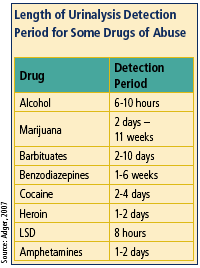

Drug testing, or toxicology screening, is a laboratory procedure used to determine if a substance is currently in an individual’s body. Drug testing is primarily done on urine, but it can also be done on hair, saliva, sweat, and other bodily tissues. The Federal Drug Testing Programs mandate the urine testing of amphetamines, cannabinoids, cocaine, some opioids, and phencyclidine. Other drugs, including alcohol, may be tested, but what drugs are tested varies. Judges may request testing for additional drugs based on the needs of a case and the capabilities of the court and laboratory.
While drug testing is important for monitoring abstinence during and after treatment it is NOT equivalent to a diagnosis of substance abuse or addiction. Random drug tests of probationers can determine if the conditions of probation have been upheld or violated (Hon, 2004). Frequent and random drug testing of probationers can also enhance treatment adherence and protect public safety by preventing behaviors like driving under the influence of alcohol or other drugs (Hon, 2004).
While drug testing is useful, it is not always done appropriately, thereby decreasing the accuracy of the test. For example, a recent study in the primary care setting found that while 95% of physicians have ordered urine toxicology screens, only 23% use an evidence-based procedure (Levy et al., 2006). This study also found that many physicians lacked the training to accurately interpret drug test results (Levy et al., 2006). Additionally, drug tests may be easily tampered with and results falsified. Therefore, whether in the medical or the justice system, careful oversight and handling procedures are necessary to prevent inaccuracies and detect falsified results. Toxicological screening must be performed under the supervision of a qualified specialist and should be conducted with the knowledge and consent of the individual being tested. Another precaution is that while judges may order many of the typically used drug tests, many drug tests do not detect drugs such as alcohol, Ecstasy (MDMA), OxyContin, and Vicodin.
Toxicology screening is a powerful tool to monitor and address relapse episodes and serves as an “early warning” device to detect problems while an individual is in treatment so adjustments can be made to the treatment plan. Drug testing should be used with other clinical screening tools to gather important data needed to determine the severity of the an individual’s problems.

For more information on drug testing Shaw, L.M and Kwong, T.C. (2001) The Clinical Toxicology Laboratory: Contemporary Practice of Poisoning Evaluation. |









